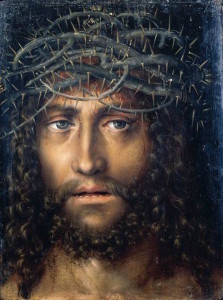In the Breviary readings for the Tuesday after Easter, we find two passages that I would like to consider.
The first is from the First Letter of Peter. It reads: “By obedience to truth you have purified yourselves.” What might it mean to “obey” truth? We notice that it does not say that we make up our own “truth.” Nor does it explain what truth is. It assumes that we know that truth is saying of something that is that it is.
What the passage tells us is to “obey” it, as if somehow truth is giving us an implicit command. And in a way, this giving a “command” is what any existing thing is all about just because it is. “Here I am, affirm or deny me!” We cannot avoid confronting what is there before us, and acknowledging what it is or what it is not.
Our minds are “measured” by the things that exist. Things are there, whether we like it or not. The very fact that we have minds does not leave us alone. We are provoked by what we are to pay attention, and what we are not. Peter says that this obedience to truth will “purify” us, as if to say that our minds are not complete without the addition of our knowing accurately, purely, what is not ourselves.
Nothing is complete until someone actually knows it. This proposition includes us. When Christ said that no one knows the Father except through me, He was also telling us something about ourselves. The purpose of this purified love of truth redounds to “the love of your brothers,” as if to say that a relation exists between being, truth, and the good we love in others. This is very Trinitarian. We are bound together in being, truth, and love.
The second passage is from St. Anastasius of Antioch (d. 302 A.D.). He wrote: “Christ has shown by his words and his actions that he was truly God and Lord of the universe.” These are very careful words. We learn from both Christ’s words and His actions. He said: “I am the way and the truth.” He acted by choosing the Twelve to accompany Him.
For every action there is a receiving. So He died on the Cross. He “suffered” both in the sense of letting it happen and in the sense of undergoing the pain and humiliation of this terrible mode of execution.

What might surprise us though is what St. Anastasius tells us that Christ’s words and actions indicate to us. It is nothing less than that: 1) He was God, and that 2) He was the “Lord of the universe.” What could it possibly mean to claim “to be the Lord of the Universe”? How could something that happened to a man two thousand years ago, during the brief time that He actually lived, indicate to us that here we have “the Lord of the Universe”?
The first part of an answer would be to ask whether anything in the man’s words suggest to us that this is what He claimed for himself. He lets stand Pilate’s question about whether He was “King of the Jews.” But even this rather narrow sphere was always pointing to a greater Kingdom wherein His followers would be as numerous as the sands of the sea. All authority in heaven and on earth was given to Him by His Father. (Matt. 28)
But the Lord of the universe seems to imply that He had a hand in it. This is what is implied in the Prologue of John. All things were made in and through Him. He is sent to restore all things. In these and dozens of other passages, the claim is made. And the understanding of this claim is not all that difficult to understand. So let us let it rest there. The claim was made in words.
Is there any “proof” of the claim? Or were these all just fancy words from some weird Hebrew or Greek mind?
On Easter Tuesday, this is where the fact of the Resurrection comes in. Strenuous efforts, of course, have been made to “prove” that the Resurrection never happened. There is good reason for these efforts. If these efforts fail to show that the Resurrection did not happen, we are left with the fact that it did.
The Resurrection is the key to the Beginning and the End of the meaning of the universe. The universe is shot through with intelligence. It exists so that reasonable beings other than God could exist. These rational beings, are, each, offered eternal life, which is what the Resurrection is about. It grounds, as it were, the offer. The universe, essentially, is filled with choices for and against God’s creative intention.
Nothing more, nothing less.















